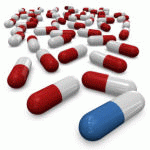Pharmacology
|
3 april 2020 17:03:30 |
| Marine Drugs, Vol. 18, Pages 191: Secondary Metabolites from the Culture of the Marine-derived Fungus Paradendryphiella salina PC 362H and Evaluation of the Anticancer Activity of Its Metabolite Hyalodendrin (Marine Drugs) |
|
Tweet High-throughput screening assays have been designed to identify compounds capable of inhibiting phenotypes involved in cancer aggressiveness. However, most studies used commercially available chemical libraries. This prompted us to explore natural products isolated from marine-derived fungi as a new source of molecules. In this study, we established a chemical library from 99 strains corresponding to 45 molecular operational taxonomic units and evaluated their anticancer activity against the MCF7 epithelial cancer cell line and its invasive stem cell-like MCF7-Sh-WISP2 counterpart. We identified the marine fungal Paradendryphiella salina PC 362H strain, isolated from the brown alga Pelvetia caniculata (PC), as one of the most promising fungi which produce active compounds. Further chemical and biological characterizations of the culture of the Paradendryphiella salina PC 362H strain identified (-)-hyalodendrin as the active secondary metabolite responsible for the cytotoxic activity of the crude extract. The antitumor activity of (-)-hyalodendrin was not only limited to the MCF7 cell lines, but also prominent on cancer cells with invasive phenotypes including colorectal cancer cells resistant to chemotherapy. Further investigations showed that treatment of MCF7-Sh-WISP2 cells with (-)-hyalodendrin induced changes in the phosphorylation status of p53 and altered expression of HSP60, HSP70 and PRAS40 proteins. Altogether, our study reveals that this uninvestigated marine fungal crude extract possesses a strong therapeutic potential against tumor cells with aggressive phenotypes and confirms that members of the epidithiodioxopiperazines are interesting fungal toxins with anticancer activities. |
| 225 viewsCategory: Biochemistry, Molecular Biology, Pharmacology |
 Marine Drugs, Vol. 18, Pages 190: Marine-Inspired Bis-indoles Possessing Antiproliferative Activity against Breast Cancer; Design, Synthesis, and Biological Evaluation (Marine Drugs) Marine Drugs, Vol. 18, Pages 190: Marine-Inspired Bis-indoles Possessing Antiproliferative Activity against Breast Cancer; Design, Synthesis, and Biological Evaluation (Marine Drugs)Marine Drugs, Vol. 18, Pages 192: A Novel High-Throughput Screening Platform Identifies Itaconate Derivatives from Marine Penicillium antarcticum as Inhibitors of Mesenchymal Stem Cell Differentiation (Marine Drugs) 
|
| blog comments powered by Disqus |
MyJournals.org
The latest issues of all your favorite science journals on one page
The latest issues of all your favorite science journals on one page



